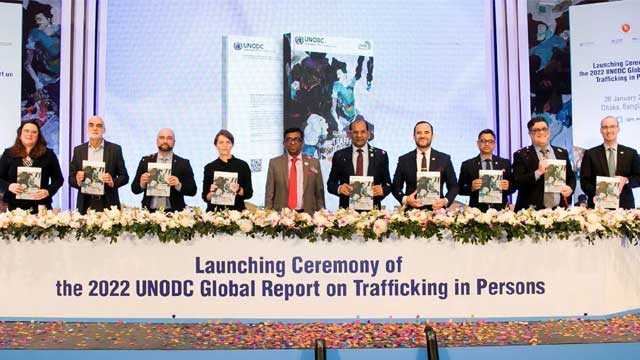Climate refugees in Bangladesh, and especially the poor, are more vulnerable to human trafficking, a United Nations (UN) report said.
The report also said that human traffickers are most active in the Sundarbans and coastal areas of the country's Khulna region.
It was announced at the release of the United Nations Office on Drugs and Crime (UNODC) Global Report on Trafficking in Persons 202, at a Dhaka hotel on Thursday.
This event is implemented by UNODC and International Organization for Migration (IOM).
The UN report called the Sundarbans, located between Bangladesh and parts of India, a hotspot for climate change-related disasters.
Many people in the region are at risk of displacement due to climate change. Hence, many are tempted by human traffickers' offers as they promise them a better life.
The victims, especially women and children, are not only trafficked into slavery but many of them are being used in the illegal organ business. Besides Khulna, human trafficking cases in the Sylhet region have increased, the report underscored.
The UN report also said that the crops and resources in the Sundarbans area have been damaged due to floods and cyclones.
As a result, 43% of the population of the region has been living below the poverty line since 2014.
Human traffickers operate the entire operation in conjunction with private businesses and international crime syndicates, the report said.
It, however, did not mention anything about the Rohingya community's trafficking cases.
Besides that, the UN report also emphasizes how human trafficking has increased due to climate change.
Human trafficking has increased in Bangladesh and the Philippines after millions of people were displaced by devastating cyclones and typhoons, the report mentioned.
Regarding Bangladesh, the report said that in 2020 there were 730 cases of human trafficking. Meanwhile, there were 778 cases in 2017 and 561 in 2018.
Globally, the number of convictions for trafficking offences fell by 27% in 2020 from the previous year – with sharper decreases registered in South Asia at 56%.
In addition, the number of victims detected globally fell by 11% in 2020 from the previous year, driven by fewer detections in low and medium-income countries.
The report also illustrates emerging evidence on the nexus between climate change-related disasters and human trafficking.
Md Aminul Islam Khan, senior secretary to the Ministry of Home Affairs said: “The emerging effects of Covid-19 and climate change on human trafficking trends and patterns are alarming. I urge our national and international partners to prioritize strengthening capacities to identify trafficking in persons and focus on creating a victim-friendly criminal justice system".
UN Resident Coordinator in Bangladesh, Gwyn Lewis, said: “We must redouble our efforts to seriously and effectively address poverty and systemic inequalities with sustainable, inclusive responses. Those we leave behind are those we surrender to traffickers.”
"Data collection and analysis, research, and reports on human trafficking can assist the government, policymakers, and actors in strengthening the evidence-based formulation and implementation of policy and programming to address the causes and factors of human trafficking,” said Abdusattor Esoev, Abdusattor Esoev, IOM Bangladesh's chief of Mission, IOM Bangladesh & Coordination of Bangladesh UN Network on Migration (BDUNNM).
Regional Representative, UNODC Regional Office for South Asia, Marco Teixeira said: “While human traffickers are becoming more tech-savvy, and are able to use technology successfully to their advantage -- technology can also become an enhancing tool for the criminal justice system to detect, investigate and prosecute traffickers.”
This edition of the Global Report provides a snapshot of the trafficking patterns and flows detected during the Covid-19 pandemic.
It covers 141 countries and provides an overview of the response to the trafficking of persons at global, regional, and national levels, by analyzing the cases detected between 2018 and 2021.
A major focus of this edition of the report is on trends of detections and convictions that show important changes, compared to historical trends since UNODC started to collect data in 2003.
The findings are further informed and enriched through the analysis of summaries of 800 court cases adjudicated between 2012 and 2020, providing closer insights into the crime, its victims and perpetrators, and how trafficking in persons comes to the attention of authorities.
The report shows higher levels of impunity in Sub-Saharan Africa and South Asia.
Countries in these regions convict fewer traffickers and detect fewer victims than the rest of the world.
At the same time, victims from these regions are identified in a wider range of destination countries than victims from other regions.
Khairul Alam Shiekh, additional secretary, Public Security Division, Ministry of Home Affairs, and Project Director for GLO.ACT-Bangladesh; Maurizio Cian, head of cooperation, Delegation of the European Union to Bangladesh; Bradley Coates, counsellor (Political and Public Affairs), High Commission of Canada in Bangladesh; Toufiq Islam Shatil, director general (UN), Ministry of Foreign Affairs; and Eurídice Márquez, GLO.ACT program management officer, UNODC.





